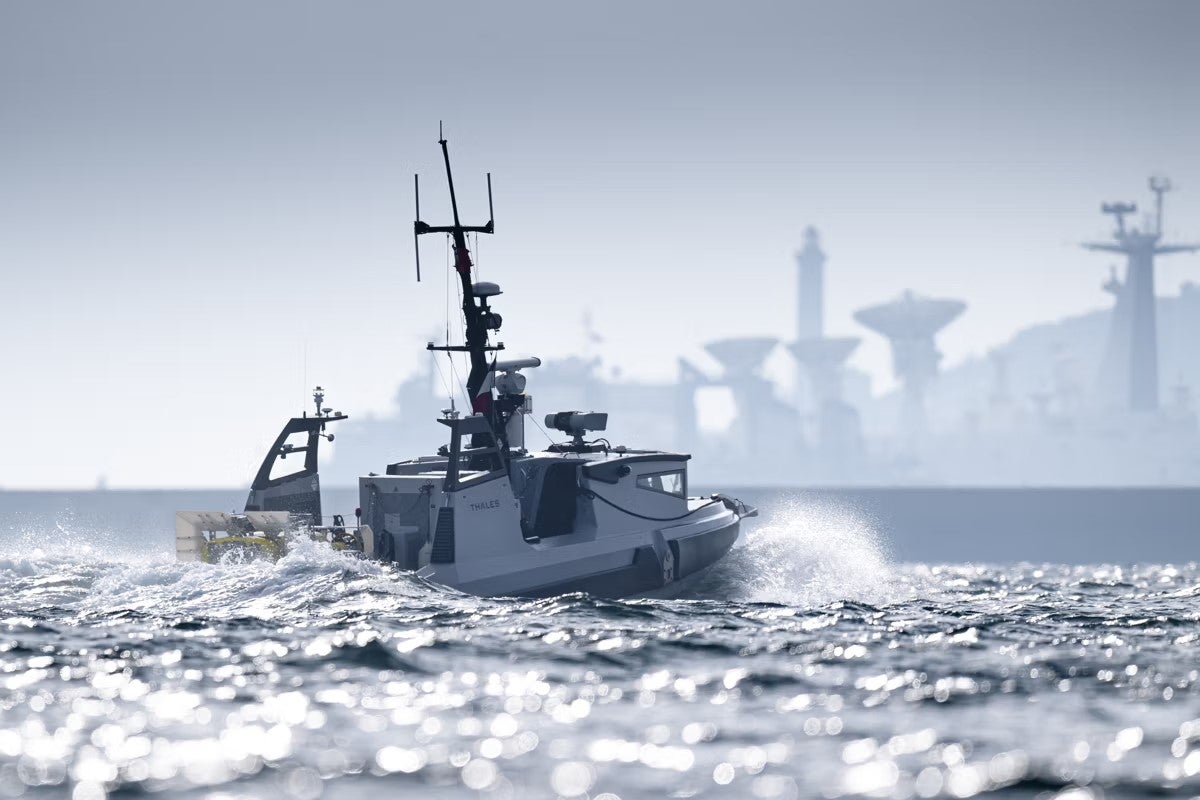
Thales has achieved a breakthrough in the development of autonomous mine-hunting operations.
The Royal Navy Motor Boat Apollo, an Uncrewed Surface Vessel delivered by Thales, has completed a series of open-water assurance trials, proving the viability of remotely controlled uncrewed vessels in mine hunting.
Thales’s Anglo-French autonomous achievement
This achievement, part of the Anglo-French Maritime Mine Counter Measures program, will pave the way for the deployment of autonomous mine clearance platforms, ensuring the safety of naval personnel while enhancing the UK and France’s position as frontrunners in naval autonomous systems technology.
The trials, which took place in December 2022, were overseen by the Royal Navy Maritime Autonomous System Trials Team with support from Thales. Representatives from the UK Naval Authority and Technology Group and the Mine Hunting Capability team from the Ministry of Defence were present at the trials held off Weymouth Bay.
The tests conducted by the RNMB Apollo have established that remotely controlled uncrewed vessels can be operated by a shore-based control station, completing tasks while maintaining awareness of their course and position through line-of-sight communications systems. This represents the first-ever UK Military clearance of its kind.
Equipped with advanced sensors, including radar, LIDAR, and electro-optical and infrared cameras, the RNMB Apollo continuously transmitted its position to the command and control centre through a secure communications network.
The vessel’s data was processed using Thales MCube mission management software, which integrated the sensor inputs into a coherent tactical picture. This advanced connectivity enabled the ship to detect and track other vessels, taking necessary actions such as remotely controlled avoidance manoeuvres.
The deployment of uncrewed mine clearance platforms will enable the Royal Navy to safeguard shipping lanes and secure sea lines of communication without exposing sailors or crewed platforms to potential threats.
These vessels exhibit high reliability, autonomy, and cybersecurity rates, allowing them to operate in national waters or be air-transported to danger zones worldwide for mine-hunting purposes. Furthermore, their capabilities can be deployed and operated from ship and shore bases, providing adaptable solutions.
Full operating capability expected 2024
RNMB Apollo is one of two pre-production uncrewed surface vessels delivered to the Royal Navy and Marine Nationale (French Navy) in December 2021 as part of the joint UK-France Maritime Mine Counter Measures (MMCM) program. This collaboration aims to equip both navies with autonomous mine-hunting capability, further reinforcing the close partnership between the two nations.
As Thales moves into the production phase of stage two of the contract, the company is actively working with its customers to deliver full operating capability to the UK and France by 2024.
Alex Cresswell, Chief Executive and Chairman of Thales UK emphasised these trials’ significance, stating, “They represent one of the first important steps in gaining trust in uncrewed vessels in a complex program. The trial is a critical remote operation stepping stone towards autonomous mine hunting.”
With Thales’ pioneering efforts and the completion of these trials, the future of autonomous mine-hunting operations appears promising, delivering increased efficiency, safety, and strategic advantage to naval forces worldwide.
Thales announced UK jobs boost as part of a significant global expansion in March this year. Thales also recorded a 9.4% ‘organic’ increase in sales in Q1 of FY23, attributing its growth to solid dynamics and mature markets in different regions, especially Europe and North America.




